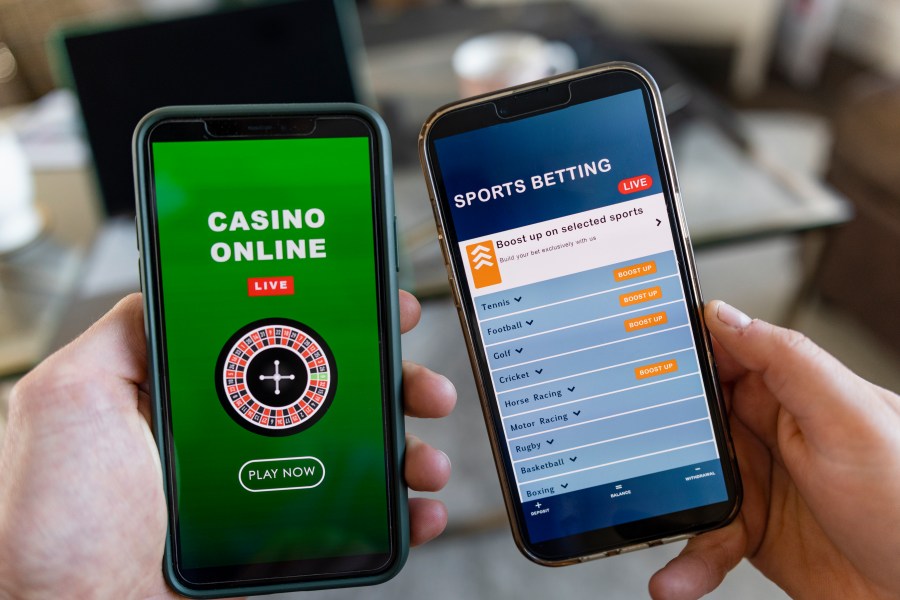One state is betting on technology to address problem gambling

Something tells me there were a lot of broken brackets and lost bets this March Madness season.
The American Gaming Association says the NCAA tournament has become the most wagered-on sporting event, with about a quarter of U.S. adults putting money on games this year.
Sports gambling has exploded since a 2018 Supreme Court decision removed blanket federal prohibitions, and online options have made it easier than ever to place bets.
But that growth has also brought a rise in problem gambling. It’s something the state of New Jersey is looking to combat digitally.
Devin O’Connor, a senior reporter for Casino.org, says New Jersey’s division of gaming enforcement is working with operators of gambling sites to electronically track players — across online platforms — for signs they might have a problem. They’re monitoring not only sports bettors online, he said, but online casino gamblers as well to see if and when their playing escalates.
O’Connor: When a player signs up for an online gaming account, they’re already consenting to having their data monitored. And the DGE, the state now, is just trying to take that data and apply it to responsible gaming and try to help those that might be developing problems.
Signs of possible addiction include a player gambling for longer periods each week or spending down all the money in their digital wallet and then adding more.
That’s according to psychologist Michael Auer, the founder of Neccton, which makes the software used by gaming companies in New Jersey.
Michael Auer: And not surprisingly, players have a very bad idea about their gambling, especially, I mean, the more they gamble, the more frequently they gamble, the worse it actually becomes.
When Neccton’s player protection software detects addictive patterns, it automatically sends an alert.
O’Connor at Casino.org says the notifications start out friendly.
O’Connor: Hey, you’re spending more time gambling. You’re gambling more and more. Just a heads-up.
But if the behavior continues …
O’Connor: They’re going to be forced to watch a tutorial on responsible gambling, gaming and the possible dangers of gambling irresponsibly.
And if a player still doesn’t pull back, a responsible gaming staff member gets involved.
O’Connor: They’re going to reach out directly and make personal contact with the player just to make sure they’re gambling within their means.
Now, anyone who’s tried setting bedtime or browsing limits on their phones knows these alerts are pretty easy to ignore. Auer has found that players are more likely to heed a digital nudge when they’re on the upswing.
Auer: At that point in time, when they are in the winning zone, they are much more receptive to follow that recommendation. I mean, one thing that problematic players do is they rarely withdraw. So, the gamble, they will, I mean, they deposit, they gamble, they win, and then they gamble it all away again.
New Jersey is the first state to use online gambling data to monitor player behavior this way. And the stakes are high. Research from Rutgers University shows that about 13% of the state’s population would qualify as problem gamblers.
That’s more than six times the national average, though it’s hard to compare since the data is not being analyzed like this anywhere else.
Related links: More insight from Meghan McCarty Carino
The New Jersey division of gaming enforcement released the initiative in February. The state is the only jurisdiction that requires yearly evaluations of how online gambling is contributing to problem behaviors.
That research is done by the Rutgers University Center for Gambling Studies. Lia Nower, the center’s director, published an essay on The Conversation warning about an increase in problem gambling among young people in the state.
She writes that people between the ages of 21 and 24 are the fastest-growing group of sport bettors. They’re more likely to place bets during game play, when emotions are high and less likely to set limits for their betting.
Nower also says research shows that the younger people are when they start gambling, the more activities they tend to bet on and the more likely they are to develop serious gambling problems.
The future of this podcast starts with you.
Every day, the “Marketplace Tech” team demystifies the digital economy with stories that explore more than just Big Tech. We’re committed to covering topics that matter to you and the world around us, diving deep into how technology intersects with climate change, inequity, and disinformation.
As part of a nonprofit newsroom, we’re counting on listeners like you to keep this public service paywall-free and available to all.
Support “Marketplace Tech” in any amount today and become a partner in our mission.


















